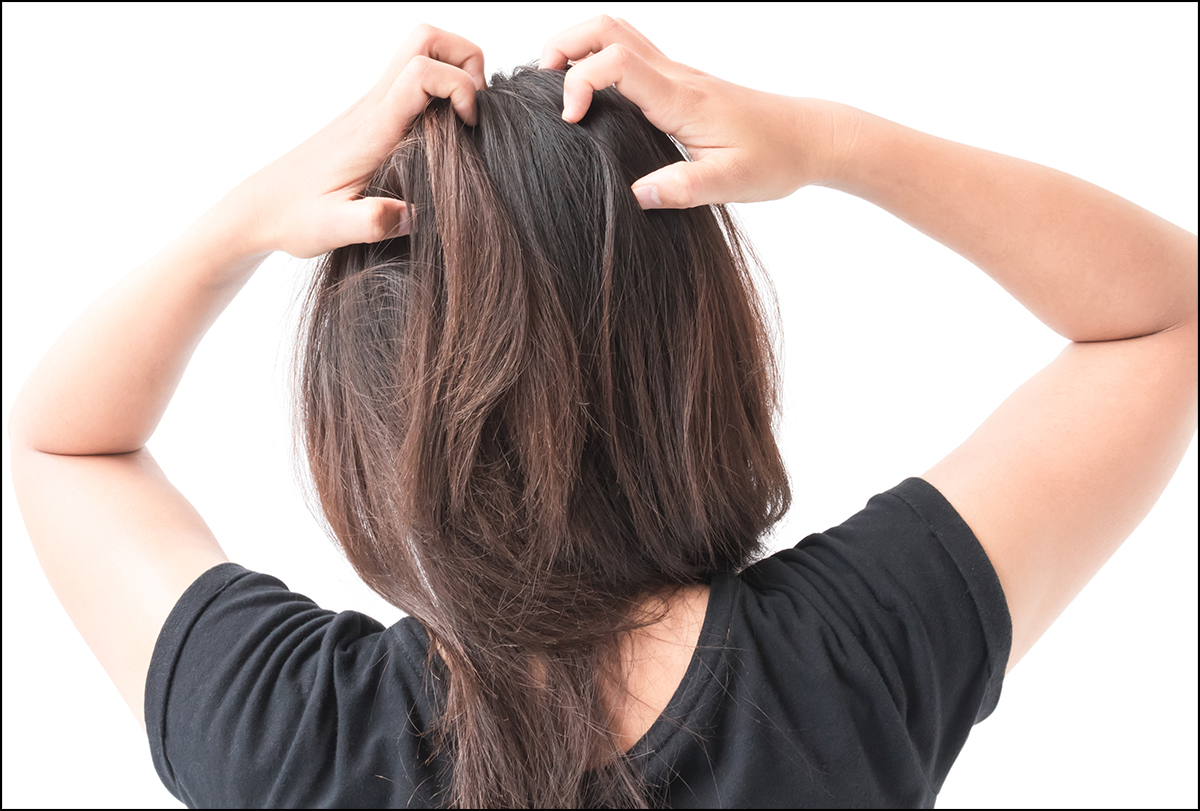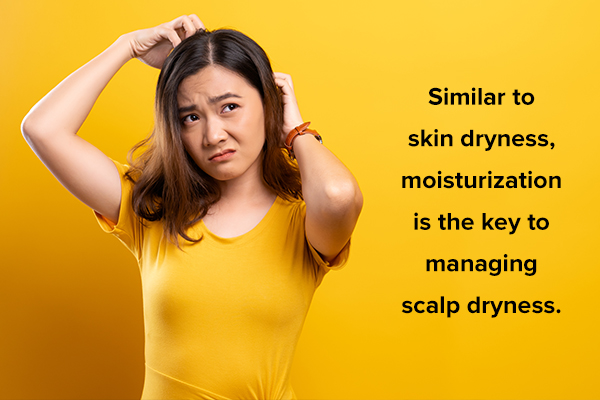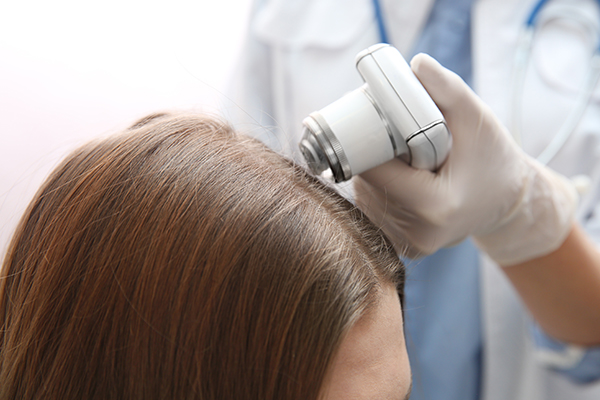In this article:
Dry scalp is a highly common problem that occurs due to a lack of moisture and oil on the scalp. This can lead to dandruff as the skin turns dry and flakes off.

The scalp is naturally moisturized by the oil released by the sebaceous glands in the hair follicles. Various factors can affect the production of this oil, turning the scalp dry and flaky.
While dry scalp affects people of all ages, it is common among older people as the skin turns drier with age. (1)(2)
Causes of Dry Scalp

Several factors can contribute to the development of dry scalp, including:
1. Seborrheic dermatitis/dandruff
Dandruff refers to the skin flakes visible on the head. This is generally caused by excessive sebum on the scalp, which prevents the dead skin cells from shedding normally, causing a buildup of skin cells. This, in turn, causes scalp dryness. (3)
2. Eczema
Eczema of the scalp can cause redness, dryness, itchiness, and flakiness on the scalp.
3. Hair products and styling habits
Frequent use of hair products such as dyes, alcohols, fragrances, preservatives, and sulfates can cause residue buildup on the scalp and dry it. (4) Heat styling can also dry up your scalp.
4. Excessive washing
Washing the hair frequently can strip the natural oils from the scalp and prevent the sebum layer from regenerating. However, not washing the hair for long can also contribute to scalp dryness.
5. Psoriasis
It is a common skin disorder that causes scaling, flaking, and redness. While this condition is similar to dandruff, the scales are thicker and more in number in psoriasis.
6. Allergies
Exposure to allergens can cause contact dermatitis of the scalp, making it dry, red, and itchy.
7. Pollution
Environmental pollution including dirt, dust, and grime can make the scalp dirty and can increase the risk of scalp problems.
8. Stress
Stress can trigger the onset of scalp conditions such as dandruff, which ultimately leads to scalp dryness.
9. Diet
Excessive intake of carbohydrates and sugars can lead to a fungal infection, resulting in a dry scalp.
10. Seasonal changes
The winter season can cause scalp dryness along with skin dryness. Hence, it is common for people to experience dry scalp throughout the cold, dry season.
Symptoms of Dry Scalp
Dryness in the scalp often affects the hair, making it look dry, dull, and frizzy. Moreover, dryness in the scalp can feel uncomfortable and tight.
Dry scalp is often confused with dandruff-related conditions. However, dandruff causes flakiness of the scalp while the hair continues to look oily. A dry scalp also causes itching, generating the urge to scratch the scalp often.
Medical Treatment for Dry Scalp

Scalp dryness can be the result of a number of factors and has to be addressed accordingly. The doctor will properly examine your condition and then recommend the appropriate treatment to resolve the root cause. This basically involves using the right kind of hair care products to moisturize your scalp and banish any related complications such as dandruff and infections.
What may work for dandruff-caused scalp dryness could be useless for heat-styling-caused dryness. Consulting a dermatologist will help you plan your hair care regimen and choose the right products.
The doctor may prescribe medicated shampoos and other hair products or suggest suitable alternatives to regular ones.
Here are a few things to look for in hair products when dealing with a dry scalp:
- Moisturizing shampoos that contain hyaluronate, hyaluronic acid, urea, sorbitol, glycerin, glycosaminoglycans, or sodium lactate
- Hair products that are devoid of any harsh chemicals such as dyes, fragrance, sulfates, or parabens that strip the moisture from your scalp and hair to make them even more dry and irritated
- Salicylic acid, to remove scale buildup associated with dry, flaky scalp (5)
- Ketoconazole or selenium sulfide, which acts as an antifungal agent to banish dandruff
- Coal tar, to lower the formation of dead skin cells on your scalp (6)
- Zinc pyrithione, which is both an antibacterial and antifungal agent, to keep your scalp infection-free
- Hair dyes made from vegetable extracts (rather than harsh chemicals), which will color your hair while nourishing and lubricating your dry scalp
- Nonalkaline shampoos with a pH of 6–7, which helps maintain the naturally acidic environment of the hair and scalp to prevent microbial growth and keep your cuticles closed for minimal frizzing, breakage, and split ends
Diagnosing Dry Scalp
Since dry scalp is a common mild condition, it can be self-diagnosed through the symptoms. You can consult a doctor to help determine the cause of scalp dryness. The doctor may take your medical history, conduct a physical examination, and even order a biopsy if he suspects psoriasis or infection.
When to See a Doctor

While scalp dryness can generally be treated with self-care, you must consult a doctor if the problem persists. Additionally, it is vital to consult a doctor if you suspect seborrheic dermatitis, a severe form of dandruff that causes painful inflammation.
Moreover, scalp dryness accompanied by other symptoms such as sores, or open wounds, should be checked by a doctor.
Final Word
While scalp dryness is a common problem, especially in the winter, it must not be ignored. It is vital to take proper care of your scalp and moisturize it to keep such a problem at bay.
Self-care measures can include the use of special shampoos, oil masks, and scalp serums. However, if the scalp dryness is associated with itching, irritation, or flakiness, it is best to consult a doctor.

- Was this article helpful?
- YES, THANKS!NOT REALLY


